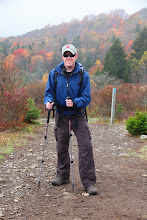November, 2004
 Out of sheer boredom, I found myself perusing my old word documents this evening and stumbled upon a college essay I wrote my sophomore year. The assignment was titled, "Portrayal of America," and I chose to write about the Boy Scouts of America, being fresh out of the program and a proud Eagle Scout. Anyhow, my writing skills are not that developed yet, but I think this is a pretty cool treatise on the Boy Scouts as an organization...how it came to be, what it stands for, and what it has to offer the youth of our nation. While all of the events depicted in the article are real, I took the creative liberty of changing names and details. Here follows Part I...
Out of sheer boredom, I found myself perusing my old word documents this evening and stumbled upon a college essay I wrote my sophomore year. The assignment was titled, "Portrayal of America," and I chose to write about the Boy Scouts of America, being fresh out of the program and a proud Eagle Scout. Anyhow, my writing skills are not that developed yet, but I think this is a pretty cool treatise on the Boy Scouts as an organization...how it came to be, what it stands for, and what it has to offer the youth of our nation. While all of the events depicted in the article are real, I took the creative liberty of changing names and details. Here follows Part I... The Longest Hike
The Appalachian Trail – April 1999
At 7:30 in the morning, the sun sprinkles droplets of light through a canopy of overhanging tree branches. Beneath it, the boys of Troop 891 awake and crawl from the comfort of their tents and squint in awe.
“It’s a beautiful morning, boys!” cries a strong-looking man wearing a bright red fleece jacket, olive green shorts, socks hiked up to his knees, and a pair of well-worn, sturdy hiking boots. A dozen boys, ranging from the ages of eleven to seventeen, come out of their temporary homes, their hair in shambles and eyes sagging to their chins.
“The early bird gets the worm,” says the man adorned in traditional Scout fatigue, their Scoutmaster, Mr. Reynolds. The boys groan but know he’s right. They have six more miles to hike that morning – all up hill – and they hiked eleven the day before. If they intend to make it the distance, they had better consume a decent breakfast.
 They split into their patrols – each with its own unique name – and the designated cooks gets to work on the meal. However, some boys are less prepared than others. Those who have not brought along the proper equipment mope around, kicking small rocks and stirring clouds of dirt. No one has been cheated here. It is their own fault if they’re unhappy. Some of these boys are learning self-reliance the hard way. No one is required to help them, but someone always does out of kindness.
They split into their patrols – each with its own unique name – and the designated cooks gets to work on the meal. However, some boys are less prepared than others. Those who have not brought along the proper equipment mope around, kicking small rocks and stirring clouds of dirt. No one has been cheated here. It is their own fault if they’re unhappy. Some of these boys are learning self-reliance the hard way. No one is required to help them, but someone always does out of kindness.It requires some time to take down their tents, shake the rain flies dry of the dripping dew, clean up their cooking utensils, and secure their backpacks with all their gear. Some boys have more to carry, because they have brought some items they did not need. With experience, they will learn to weigh the necessities. The boys sleep two to a tent; therefore, they split the weight when hiking. The younger boys are far less experienced when it comes to camping, and it is the senior Scouts’ duty to aid and encourage them in this new experience. Paul and Drew – both seventeen – are the oldest on this trip, nearly Eagle Scouts. After packing up their gear, they tend to the younger boys’ needs, and they do it willingly, because they remember when they, too, were young and needy.
In little over an hour, the boys are ready to go. Paul and Drew lead the Troop on this six-mile portion of the Appalachian Trail in Northern Virginia, with the scouts ages thirteen to fifteen trailing right behind. Mr. Reynolds takes up the rear with another volunteer scoutmaster, Mr. Haywood, in order to make sure no one is left behind. The youngest Scouts hike just ahead of them, awkwardly lugging their twenty to twenty-five pound external frame backpacks. Determined to prove themselves capable, they complain little and help each other along the way.
The six-mile ascent proves long and tiring, even for Paul and Drew. But they eventually reach the parking lot where their trailer and vehicles have been awaiting their arrival. Paul unfastens his waist belt and lets his pack slide off his back. Leaning against the trailer, he breathes in deeply before taking a huge swig of water from his indestructible Nalgene bottle. Realizing he has just completed another grueling hike on a tough mountain trail, he grins in satisfaction. It has been a weekend well spent, and he’s proven to himself yet again that he is up to the challenge.










No comments:
Post a Comment